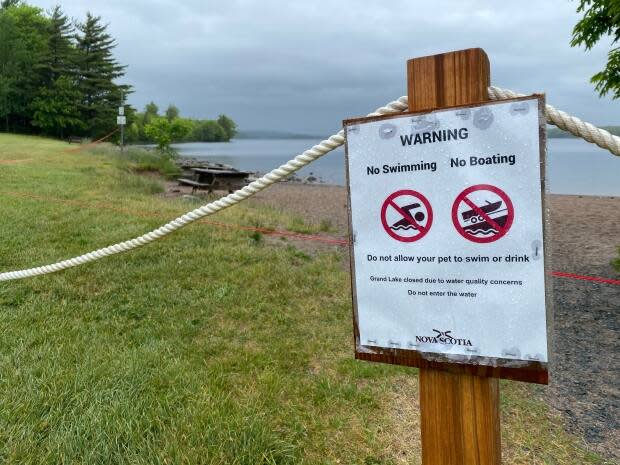No provincial support for Grand Lake homeowners to dig wells after blue-green algae confirmed

Homeowners looking for a new water source after blue-green algae was confirmed in Grand Lake, N.S., should not expect the provincial government to help foot the bill.
"Homeowners are responsible for the cost of getting safe drinkable water to their home, whether they hook up to a municipal system or dig a well," provincial Environment Minister Keith Irving said Thursday.
Irving said the province's role is to investigate and provide information to the public so they can make informed decisions.
"We've investigated, we've determined the source of the problem, and we're sharing that information ... that's including signage and lots of information on our website," Irving said.
The investigation began after a person went to hospital and two dogs died on June 9.
On Tuesday, test results confirmed the presence of blue-green algae in Grand Lake. Blooms will come and go out of the water, but there is no way to treat them.
Once blue-green algae is in the lake, it is no longer safe to use as a water supply.
Municipalities can offer financing
The province issued an advisory on June 10 warning homeowners with wells that are 30 metres or less deep and located within 60 metres of Grand Lake that their water supply was not safe for drinking, bathing or cooking.
Municipalities can offer financing programs to help people needing to make a change for "environmental reasons."
Irving referenced the extremely dry summer a few years ago that caused wells on the province's South Shore to run dry.
"We provided enabling legislation for municipalities to set up a financing program to help homeowners make a transition. In the case of the South Shore, it was digging wells. That may be something that homeowners wish to look at," he said.
In a virtual public meeting held Thursday evening, deputy environment minister Julie Towers said the Halifax Regional Municipality does have a financing program to help with the cost of water supply or improving a sewage disposal system.
Grand Lake is located in both the Halifax Regional Municipality and the Municipality of East Hants.
Towers said water testing is also not paid for by the province, but information on what to test for and how often is available on the province's website.
Bacteria tests are cheaper than chemical tests and should happen more frequently. For a drilled or dug well, bacteria tests are recommended twice a year. Chemical tests are recommended once every two years.
Towers said Wednesday her department estimates there are between 200 and 250 homeowners in the Grand Lake area without registered wells.
MORE TOP STORIES

 Yahoo Movies
Yahoo Movies 